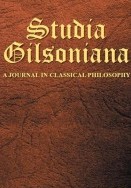THOMAS AQUINAS’ PHILOSOPHY OF BEING AS THE BASIS FOR WOJTYŁA’S CONCEPT AND COGNITION OF HUMAN PERSON
THOMAS AQUINAS’ PHILOSOPHY OF BEING AS THE BASIS FOR WOJTYŁA’S CONCEPT AND COGNITION OF HUMAN PERSON
Author(s): Małgorzata Jałocho-PalickaSubject(s): Philosophy
Published by: International Étienne Gilson Society
Keywords: esse; being; existence; essentia; essence; Absolute; contingency; individua substantia; act; potency; actus humanus; human action; fieri;
Summary/Abstract: The article makes a claim that Thomas Aquinas’ philosophy of being plays a fundamental role in Karol Wojtyła’s concept of person presented in his major anthropological work Osoba i czyn (known in English as The Acting person). Aquinas discovered that every being is composed of existence (being, esse) and essence (essentia). Wojtyła builds his philosophy of personhood within this framework of esse (being, existence) and essentia (essence). The moral and rational essence of human person, according to Wojtyła, is best revealed by specifically human, free and conscious, actions. That is why Wojtyła analyzes human person through his actions and discovers such essential structures of human reason and free will as self-cognition, self-knowledge, self-owning, self-ruling which make the ontic basis for selfgovernance. The immediate ground for Wojtyła’s analysis of person through his actions is the act and potency theory, developed by Aristotle and redefined by Thomas Aquinas in the light of the composition of being from esse and essentia. Every act reveals a correlated potency which otherwise would remain hidden and unknown. Potency-act theory characterizes not only two real states of every being, but also it is the adequate tool to describe every being’s becoming. It is not becoming out of nothingness, but on the ground and within the limits of already existing potency. A specifically human action (actus humanus) discloses a specifically human potency-essence. Through his actions a man becomes good or bad as a man, depending on the moral quality of the actions. All these insights into man’s essence presented by Wojtyła emphasize the absolute primacy of a man’s existence (being, esse) over his actions and over his becoming. Being (esse) precedes acting and becoming. Without being (esse) there would be no acting and no becoming (operari sequitur esse—first something must exist and only then it can act). Thus, as a contingent being, a man does not owe his existence to himself but to the Absolute Being (Ipsum Esse); and his human dignity stems, first of all, from his being, not from his doing.
Journal: Studia Gilsoniana
- Issue Year: 2014
- Issue No: 3
- Page Range: 127-153
- Page Count: 27
- Language: English

